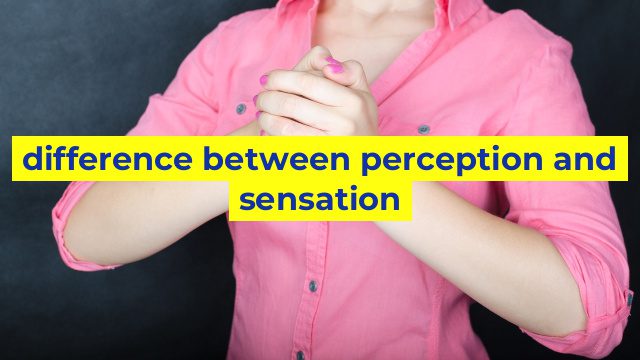The Difference Between Perception and Sensation
When it comes to understanding how we experience the world around us, it is important to know the difference between perception and sensation. While these two terms are often used interchangeably, they actually refer to distinct psychological processes.
What is Sensation?
Sensation refers to the process of detecting physical stimuli, such as light or sound waves, through our sensory organs. It is the initial step in the process of perceiving the world around us. Our senses, which include sight, hearing, touch, taste, and smell, all work together to provide us with information about the world. For example, when we see a red apple on a tree, our eyes receive the light waves reflecting off the apple, and our brain processes this information to recognize the object.
What is Perception?
Perception is the process of interpreting and understanding sensory information. It is the way in which we organize and make sense of the stimuli that we receive through our senses. Perception is influenced by a variety of factors, including our past experiences, cultural background, and personal biases. For example, if we have a negative experience with a particular food, that perception may stay with us even if we no longer find the taste unpleasant.
The Relationship Between Sensation and Perception
While sensation and perception are distinct processes, they are closely intertwined. Perception relies on our ability to detect physical sensations, but it also involves additional cognitive processes such as attention, memory, and decision-making. Perception can also influence sensation. For example, if we expect a particular food to taste good, we may perceive it as tasting better than if we had no expectations.
Why It Matters
Understanding the difference between sensation and perception is important for a number of reasons. It can help us better appreciate how we experience and make sense of the world around us. It can also be valuable in fields such as psychology, neurology, and marketing, where understanding how people perceive and respond to stimuli is critical.
In conclusion, while sensation and perception are often used interchangeably, they refer to two distinct psychological processes. Sensation is the process of detecting physical stimuli through our senses, while perception is the process of interpreting and making sense of that sensory information. Understanding the role each plays in our experience of the world can help us better appreciate and navigate the complexities of perception.
Table difference between perception and sensation
| Perception | Sensation |
|---|---|
| Perception is the process of interpreting and giving meaning to sensory information. | Sensation is the process of detecting physical stimuli from our environment through our sensory organs. |
| Perception involves cognitive processes such as interpretation, attention, and memory. | Sensation is a physiological process that occurs automatically. |
| Perception is subjective, as it is influenced by personal experiences, beliefs, and expectations. | Sensation is objective, as it solely depends on the physical properties of the stimuli. |
| Perception involves higher-level processing of sensory information, such as recognizing patterns and objects. | Sensation involves low-level processing of sensory information, such as detecting and coding the physical properties of stimuli. |
